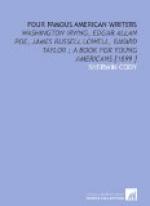’O, why should we seek to anticipate
sorrow
By throwing the flowers of
the present away,
And gathering the dark-rolling, cloudy
to-morrow
To darken the generous sun
of to-day?’
Thou seest I have good reason to remember those old times, and to be grateful to thee for encouraging instead of checking the first developments of my mind.”
You may easily guess from this letter that Bayard’s school life was very sedate and Quakerish. Nearly all the people in Kennett Square were Quakers, and though Bayard’s father and mother were not, they had all the Quaker habits. Among other things, he was taught the wickedness of all kinds of swearing. His mother “talked so earnestly on this point that his mind became full of it; his observation and imagination were centered upon oaths, until at last he was so fascinated that he became filled with an uncontrollable desire to swear. So he went out into a field, beyond hearing, and there delivered himself of all the oaths he had ever heard or could invent, and in as loud a voice as possible.” After this he felt quite satisfied to swear no more.
When Bayard was about twelve years old, his father was elected sheriff of the county and went to live at West Chester for three years. The young lad was sent to Bolmar’s Academy at that place; and when the family went back to the farm he was sent to the academy at Unionville, three or four miles from his home. Here, at the age of sixteen, he finished his regular schooling. During the last two years he studied Latin and French, and during the last year Spanish. His Latin and French he continued by private study for three years longer.
He now went back to work on the farm for a season, and, as he says, “first felt the delight and refreshment of labor in the open air. I was then able to take the plow handle, and I still remember the pride I felt when my furrows were pronounced even and well turned. Although it was already decided that I should not make farming the business of my life, I thrust into my plans a slender wedge of hope that I might one day own a bit of ground, for the luxury of having, if not the profit of cultivating, it. The aroma of the sweet soil had tinctured my blood; the black mud of the swamp still stuck to my feet.”
After a few weeks of farm life he was apprenticed to a printer in West Chester for a term of four years.
CHAPTER III
HIS FIRST POEM
It is the will and the spirit that makes every life seem happy or the reverse. If Bayard Taylor had remained a farmer in Kennett Square all his life, he would not have looked back on his early experiences with so much pleasure as he did. Indeed, we may safely say that he would not have liked his life so well at the time had it not been for his buoyant and hopeful nature, which made him feel that he was destined for higher and better things, for a world beyond the horizon.




